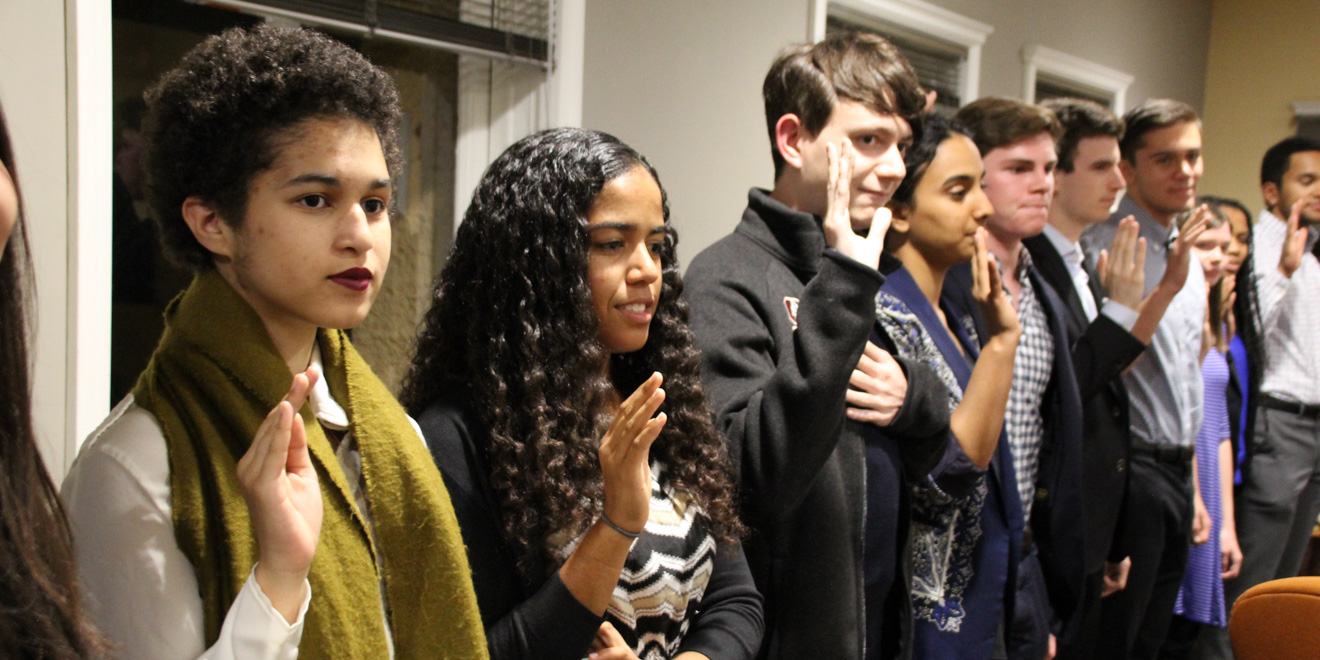This election cycle, undergraduate Senate candidates numbered just over half of what they did last year. While 40 students ran for Senate in 2016, only 24 ran in 2017, with only two senators running for reelection. The Daily sat down with a few former and current Senators to explore what may underlie this year’s decline in interest in serving on the Senate.
Variety of reasons
Reasons for the decline cited by senators ranged from the Trump administration and political disillusionment amongst students to senators’ desire to explore other activities.
Senator Gabe Rosen ’19, who is entering his second term, believes that the political climate after the 2016 election is linked to the low Senate retention rate this year. He said it may have been difficult for some students to look beyond a sense of disappointment with politics and frustration with the bureaucratic pace of change.
“It’s something I have to struggle with,” Rosen said. “Like, how can I help fight back against the bigotry of the Trump administration through my role in student Senate if we have a hard time as is even putting water fountains in Crothers?”
Rosen ran for reelection because he realized that one year was not long enough to have the kind of impact he wanted, and he plans to work next year to use appropriations for advocacy, continuing his work on initiatives like the Full House Fund.
Justice Tention ’18, who was recently elected as ASSU president, served as Senate appropriations chair during his sophomore year and chose not run for reelection last year. For his upcoming senior year, he decided to return to the ASSU by running for an executive position. Tention stated that, overall, the decision not to run for reelection is oftentimes a personal one that has to do with diversifying one’s Stanford experience, as was the case for him when he chose to focus on his job as a Resident Assistant (RA) in a freshman dorm this year.
“I gained a lot of knowledge during Senate about the ASSU… [and] what students care about and also through being an RA,” Tention said. “All of these issues need to be supported from a pretty broad base, and I just wanted to participate in some other way.”
Similarly, outgoing Senate Chair Shanta Katipamula ’19 chose not to run for reelection in part because she will be participating in Stanford in Washington this fall and wants to explore other opportunities that Stanford has to offer.
Other senators who chose not to run for another term this year, such as Cenobio Hernandez ’18, cited the high demands of the job. Hernandez also wanted to give other students the chance to learn the ropes of being a committee chair while he is still around to guide them; Hernandez served as appropriations chair this year.
Balance of perspectives
Tention emphasized that low retention rates are not necessarily negative, as new Senators bring fresh perspectives and new ideas to the table each year. However, the lack of knowledge and experience that accompanies high turnover rates necessitates an adjustment period due to a big learning curve, he said, especially in areas that have more complicated bylaws such as appropriations.
Tention added that he believes veteran senators have more realistic expectations of what the Senate can do compared to new senators, who often do not realize the limitations of the group until they are part of it.
Tention agreed with Rosen that appropriations is where the most actionable work is accomplished by the Senate. While advocacy is very important, he said, new senators oftentimes get frustrated with the bureaucracy of the Senate and its inability to enact policy on issues that require action from the administration.
Hernandez noted that he believes in the importance of funding consistency and institutional memory and as such plans to stay involved with ASSU next year. Rosen shared many of Tention’s sentiments about the importance of both experience and new perspectives, adding that retention of senators helps maintain administrative momentum on key issues.
Role of Senate
Rosen also pointed out that little is known about the Senate, and as a result, there are many misconceptions among students about what the Senate can and cannot do.
Though he did not want to minimize the importance of advocacy, Rosen contended that it is necessary for the Senate to “put its money where its mouth is” and accomplish tangible goals.
“I felt frustrated by the pace of change,” Rosen said of his first term as Senator. “I wish I could’ve changed more, but I’m very glad that I was able to do as much as I did in collaboration with everybody else.”
Katipamula argued that Senators’ roles as advocates for social change remain important, citing the Senate bill against Islamophobia and Callisto, a project to improve sexual assault reporting, as meaningful and well-publicized Senate initiatives.
She is excited to see what the next Senate pursues and said she was encouraged by the administration’s “willingness to have a conversation” with students — for example, through a recent initiative to hold administrator office hours.
“This is a key time for the Senate because there is a lot of transitioning of people coming into their roles in the administration,” Katipamula said. “Even at the highest levels of the University, with the President and Provost, they’re still new… and so they’re still learning what students want, so this is a great opportunity for the Senate to make strong statements.”
Contact Ellie Bowen at ebowen ‘at’ stanford.edu.
